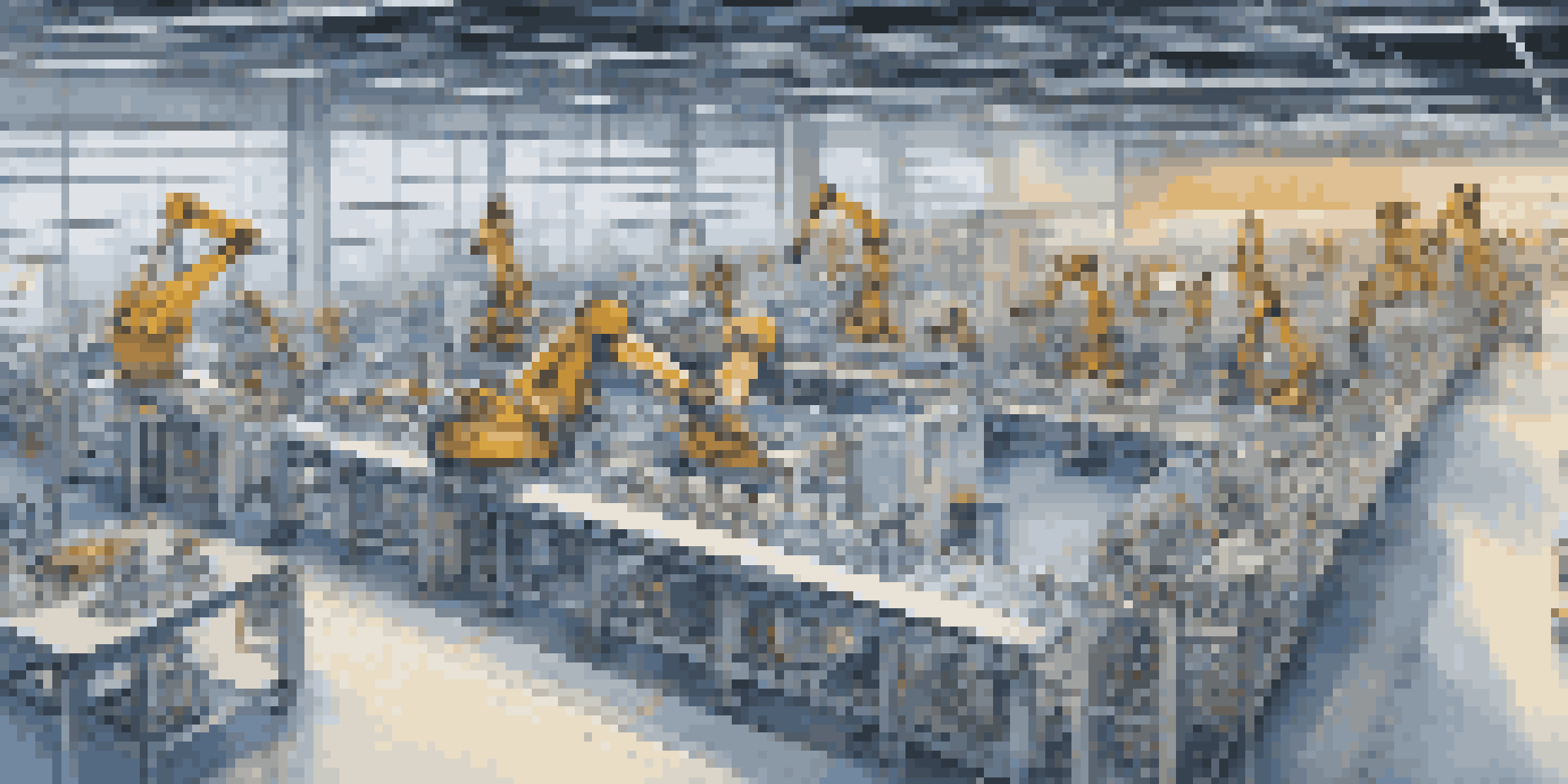Smart Manufacturing Careers: Skills for Industry 4.0

Understanding Smart Manufacturing and Industry 4.0
Smart manufacturing is a revolutionary concept that integrates digital technologies into manufacturing processes. It focuses on data-driven decision-making, automation, and real-time communication among machines, leading to increased efficiency and productivity. With Industry 4.0 at its core, this new era of manufacturing emphasizes the importance of connectivity and smart systems.
The factory of the future will have only two employees, a man and a dog. The man will be there to feed the dog. The dog will be there to keep the man from touching the equipment.
The shift towards smart manufacturing means that traditional manufacturing roles are evolving. Workers must now adapt to new technologies, requiring a blend of technical and soft skills. As industries embrace this transformation, understanding the fundamentals of Industry 4.0 becomes crucial for anyone looking to enter the field.
For those considering a career in this dynamic environment, familiarizing oneself with the concepts of smart manufacturing is essential. It sets the foundation for developing the specific skills that will be in high demand as the industry continues to innovate and grow.
Key Technical Skills for Smart Manufacturing Careers
Technical skills are the backbone of smart manufacturing careers. Proficiency in areas like data analytics, programming, and cybersecurity is increasingly important. Employees will need to analyze vast amounts of data generated by smart machines to optimize processes and enhance productivity.

Moreover, knowledge of automation technologies, such as robotics and the Internet of Things (IoT), is vital. These technologies streamline operations and reduce human error, making them invaluable in a smart manufacturing environment. Understanding how to implement and maintain these systems is a significant asset.
Smart Manufacturing Requires New Skills
As the industry evolves, both technical and soft skills are crucial for success in smart manufacturing careers.
Finally, familiarity with cloud computing and software applications used for manufacturing operations can set candidates apart. As businesses turn to cloud solutions for flexibility and scalability, having these skills can significantly enhance career prospects in the industry.
The Importance of Soft Skills in Smart Manufacturing
While technical skills are critical, soft skills shouldn't be overlooked in smart manufacturing careers. Communication, teamwork, and problem-solving abilities are essential for collaborating effectively in diverse teams. As manufacturing becomes more interconnected, the ability to communicate ideas clearly can significantly impact project outcomes.
In manufacturing, we are in a race between education and catastrophe.
Adaptability is another key soft skill that professionals in this field must possess. The rapid pace of technological advancements means that employees must be willing to learn and adjust to new methods and tools continuously. Being open to change fosters a culture of innovation, which is vital in a smart manufacturing environment.
Lastly, critical thinking skills are essential for identifying issues and developing effective solutions. In a world driven by data and automation, being able to analyze situations and make informed decisions can enhance operational efficiency and drive business success.
Educational Paths for Smart Manufacturing Careers
Pursuing a career in smart manufacturing often begins with a solid educational foundation. Many professionals in the field hold degrees in engineering, computer science, or information technology. These programs provide the necessary technical knowledge to thrive in a rapidly evolving environment.
Additionally, vocational training and certifications can significantly enhance job readiness. Many technical schools offer programs focused on automation, robotics, and data analysis, equipping students with hands-on skills. Certifications from recognized organizations can also provide a competitive edge when applying for roles.
Educational Paths Enhance Career Growth
A strong educational foundation and relevant certifications can significantly boost job readiness in smart manufacturing.
Furthermore, continuous education plays a crucial role in career advancement. Online courses and workshops focusing on emerging technologies can help professionals stay updated with industry trends and innovations, ensuring they remain relevant in the workforce.
Industry Certifications That Enhance Career Opportunities
Certifications can be a game-changer in smart manufacturing careers, showcasing expertise and commitment to the field. Popular certifications like the Certified Manufacturing Engineer (CMfgE) or the Certified Automation Professional (CAP) validate skills and knowledge in critical areas. Earning these credentials can help candidates stand out in a competitive job market.
Many organizations also offer specialized certifications focused on specific technologies, such as IoT or robotics. These certifications provide targeted training, helping professionals deepen their understanding and proficiency in niche areas. As industries evolve, having specialized skills can open doors to unique career opportunities.
Moreover, pursuing certifications demonstrates a proactive approach to professional development. Employers value candidates who show initiative in expanding their skill set, as it indicates a dedication to improvement and a willingness to adapt to changing industry demands.
Networking and Building Relationships in the Industry
Networking is a vital component of career development in smart manufacturing. Building relationships with industry professionals can lead to job opportunities, mentorship, and collaborations. Engaging in industry events, conferences, and online forums helps individuals connect with like-minded peers and established professionals.
Joining associations related to manufacturing and technology can provide valuable resources and networking opportunities. Being part of a community allows members to share knowledge, discuss trends, and access job postings. These connections can lead to referrals and recommendations, which can be crucial when seeking employment.
Networking is Key to Career Success
Building relationships within the industry opens doors to job opportunities and professional development in smart manufacturing.
Additionally, leveraging social media platforms like LinkedIn can enhance networking efforts. By showcasing skills, experiences, and accomplishments, professionals can attract potential employers and collaborators. Maintaining an active online presence can make a lasting impression in the fast-paced world of smart manufacturing.
Future Trends Shaping Smart Manufacturing Careers
As we look to the future, several trends are poised to shape smart manufacturing careers. The rise of artificial intelligence (AI) and machine learning is transforming how manufacturing processes are managed. Professionals will need to harness these technologies to optimize production and improve decision-making.
Sustainability is also becoming a central theme in manufacturing. As companies strive to reduce their environmental impact, skills in green manufacturing and sustainable practices will become increasingly valuable. Understanding how to implement eco-friendly solutions can set candidates apart in a competitive job market.

Finally, the demand for skilled workers in smart manufacturing is expected to grow. As more companies adopt smart technologies, the need for professionals who can manage and operate these systems will rise. This trend presents significant opportunities for those equipped with the right skills and knowledge.